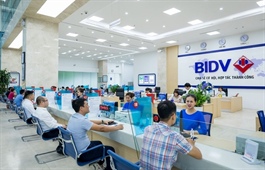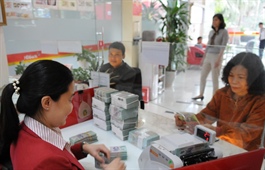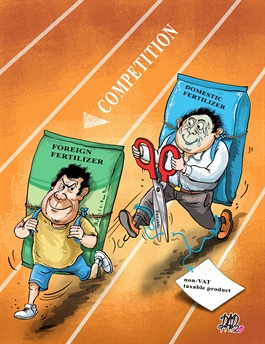State Bank of Vietnam appoints first female Governor
State Bank of Vietnam appoints first female Governor
The State Bank of Vietnam (SBV) appointed Ms. Nguyen Thi Hong as its first female Governor on 16 November. Faced with this formidable task, the challenges lying ahead for the new female Governor of the State Bank of Vietnam will be most daunting and onerous.
Ms. Nguyen Thi Hong was appointed Governor of SBV on 16 November.
|
Foreign exchange reserves
Among the highlights of the outgoing Governor Le Minh Hung's term were stability of the local currency and a sharp increase in foreign exchange reserves. By early September 2020, foreign exchange reserves had reached USD 92 bn and it is forecast that foreign reserves will reach USD 100 bn by the end of this year. Compared to foreign exchange reserves in 2017 of about USD 50 bn, this is an impressive increase and will allow more flexibility for the State Bank of Vietnam to intervene in the foreign exchange market.
This achievement was partly due to the strong inflow of investment capital into Vietnam, and an abundance of overseas remittances from diaspora working in several countries across the globe. Nonetheless, it is undeniable that the management of exchange rate in recent years by the State Bank of Vietnam has been consistent with market signals, despite huge fluctuations in major currencies that are affecting the US dollar.
However, towards the end of Governor Le Minh Hung's term, new challenges had begun to emerge. The first challenge that the State Bank of Vietnam faced was the investigation opened by the Trump administration on the possibilities of currency manipulation, and the second challenge was the strong prediction that the US dollar would depreciate strongly in coming time, especially soon after the availability of a coronavirus vaccine and new economic bailout packages in the USA.
A survey done by the Financial Times in mid-November found that a majority of Wall Street analysts believed that the US dollar would significantly weaken against major currencies by 2021, with a slump forecast reduction of 20%. Recently, the fact that some developing countries are choosing to issue bonds in EURO instead of US dollars, such as China, shows that a trend towards reduced dependency on the US dollar has already begun.
While the supply of the US dollar is expected to continue to increase with policies supporting market liquidity by the US Federal Reserve (Fed), and Mr. Joe Biden's multi-trillion economic stimulus package, the US dollar falling against major currencies simply reflects current supply and demand status. Accordingly, it is expected that capital flow will only enter countries that are showing positive economic growth in Asia. Vietnam happens to be one such country but is facing a challenge in the exchange rate policy.
If foreign capital pours in abundance, the State Bank of Vietnam may consider buying foreign currency to maintain exchange rate stability and avoid a strong appreciation of domestic currency against the US dollar. This move could possibly touch one of the indicators of the US Treasury Department monetary manipulation criterion, which is that of the government intervening in the foreign exchange market by buying US dollars more than 2% of GDP. This will be a big challenge for the new female Governor of the State Bank of Vietnam.
Post Covid-19 economy
All the Central Banks in the world will have to shoulder the inevitable daunting task of supporting and lifting a post Covid-19 economy, and the whole world is looking for a strong boost in restarting the economy once again. However, many businesses have faced huge financial difficulties during the current pandemic, and will need continued support in terms of interest rates and extension of repayment periods. In such a scenario, if Commercial Banks lend their support further, such business loans will most likely turn into serious bad debts.
On the other hand, if commercial banks hold off bad debts for too long, they can create a situation of "reverse incentive". In a post Covid-19 scenario, if subsidy policies are withdrawn too quickly, the economy will fall into a crisis situation in both shortages in liquidity and credit. A friend of mine who works in the banking sector said that many banks were holding back in the current Covid-19 pandemic thanks to several supportive policies, but without knowing exactly which policy is having the most impact. This is like being injected with many drugs, but not knowing which drug to withdraw or stop to avoid further damage.
According to the State Bank of Vietnam, by the end of August 2020, on-balance-sheet Non Performing Loans (NPL) ratio of the entire banking system maintained at less than 2%. Meanwhile, according to some banking industry experts, the on-balance-sheet NPL ratio may reach 3.5% to 4% in 2021, which is just double. The pressure of dealing with bad debt or balancing bank capital adequacy policy with economic support will be a difficult choice to make.
The above issues on exchange rate, bad debts, and economic support, all have technicalities to deal with, but complex policy negotiations and other intangible pressures are a major challenge. The new Governor of the State Bank of Vietnam is not only a technocrat but also a politician with capable negotiating skills and will be focused on balancing policy goals, as the State Bank of Vietnam is not a fully autonomous body that is working freely from the government, such as in some developed countries.
The new Governor has a hugely daunting task ahead and if she is weighed under impossible market pressures and macro instability, the risks of not being able to meet expectations is very high. This will only send the wrong signal that the State Bank of Vietnam can no longer be trusted, and thus decrease its credibility and effectiveness across markets. If people do not believe that the monetary policies set by the State Bank of Vietnam are able to control inflation, then inflation will surely become a serious ongoing issue.

























